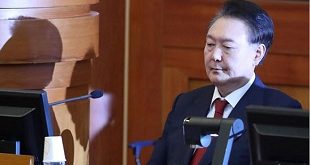
The Hague, Netherlands | AFP |
An informal people’s tribunal headed by five professional international judges Tuesday accused US seeds firm Monsanto of harming the environment and possible “ecocide”.
Monsanto, which produces genetically-modified seeds as well as controversial pesticides, however said the event was “staged by a select group of anti-agriculture technology and anti-Monsanto critics.”
Held in The Hague over two days and organised by hundreds of grassroots groups, the tribunal found that the US-based company “has engaged in practices which have negatively impacted the right to a healthy environment.”
The panel of judges heard some 30 witnesses from countries as diverse as Argentina, Bangladesh, Canada, Burkina Faso and Sri Lanka about the various impacts of chemicals on the environment including spraying crops with herbicides and pesticides.
Judges were asked six questions for an advisory opinion, including whether Monsanto violated the rights to a safe environment, food as well as the highest standards of health.
“Monsanto’s activities and products cause damage to soil, water and to the environment more generally,” the tribunal replied in a statement on Tuesday.
It urged international lawmakers to “precisely and clearly assert the protection of the environment and the crime of ecocide.”
It said that if “ecocide” was added in international law, the reported facts could fall within the jurisdiction of the International Criminal Court based in The Hague.
The event came against the backdrop of ICC chief prosecutor Fatou Bensouda saying she intended to deepen her focus on environmental crimes such as land grabs.
Monsanto’s GM seeds are designed for use alongside its pesticide glyphosate which has made headlines last year over cancer fears.
But Monsanto, headquartered in St Louis, Missouri, defended itself against the allegations saying: “We stand committed to real dialogue with those who are genuinely interested in sustainable agriculture.”
It added in a statement that anti-Monsanto critics organised the tribunal and “played organisers, judge and jury.”
The informal court “denied existing scientific evidence and judicial outcomes on several topics… and was organised with pre-determined outcomes,” the company’s global human rights steering committee said.
Monsanto is currently the subject of a mammoth $66 billion (61.6 billion euro) takeover deal by German pharmaceuticals and chemicals giant Bayer.
Bayer too faces close scrutiny over its own pesticides, accused by some of contributing to mass die-offs of bees.
 The Independent Uganda: You get the Truth we Pay the Price
The Independent Uganda: You get the Truth we Pay the Price



